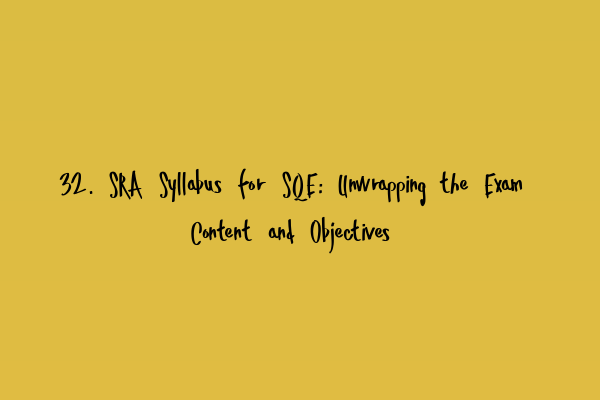32. SRA Syllabus for SQE: Unwrapping the Exam Content and Objectives
Preparing for the Solicitors Qualifying Examination (SQE) can be both exciting and overwhelming. As a prospective solicitor, it is crucial to have a comprehensive understanding of the SRA syllabus for the SQE exams. In this blog post, we will delve into the details of the exam content and objectives, providing you with the necessary insights to ace the SQE.
The SQE Exam Structure
Before we dive into the syllabus, let’s briefly recap the structure of the SQE exams. The SQE is divided into two stages: SQE1 and SQE2.
SQE1: This stage focuses on assessing a candidate’s functioning legal knowledge. It consists of two parts:
- Functioning Legal Knowledge (FLK) assessments
- Practical Legal Skills (PLS) assessments
SQE2: This stage evaluates a candidate’s practical legal skills. It consists of a range of assessments, such as written and oral tasks, to assess a candidate’s ability to apply legal knowledge and skills in practical scenarios.
The SRA Syllabus for the SQE Exams
The SRA has outlined a detailed syllabus for the SQE exams, which covers a wide range of legal topics. Let’s explore the key content areas and objectives of the SQE exams:
Functioning Legal Knowledge (FLK) Assessments:
The FLK assessments aim to test a candidate’s understanding of fundamental legal principles. The content areas covered in the FLK assessments include but are not limited to:
- Constitutional and Administrative Law
- Contract Law
- Criminal Law and Practice
- Property Law
- Tort Law
- Trusts and Equity
Related Article: If you are looking for practice exam questions to test your FLK knowledge, check out our article on SQE 1 Practice Exam Questions.
Practical Legal Skills (PLS) Assessments:
The PLS assessments focus on assessing a candidate’s ability to apply legal knowledge and skills in practical scenarios. The content areas covered in the PLS assessments include but are not limited to:
- Client Interviewing and Advising
- Case and Matter Analysis
- Legal Research
- Legal Writing
- Advocacy and Dispute Resolution
- Professional Ethics and Judgment
Related Article: To enhance your PLS skills, take a look at our article on SQE 1 Practice Mocks FLK1 FLK2.
Written and Oral Tasks:
The SQE2 assessments involve various written and oral tasks to evaluate a candidate’s practical legal skills. The content areas covered in these tasks include but are not limited to:
- Client Interviewing and Advising
- Advocacy and Oral Presentation
- Legal Drafting
- Legal Research and Writing
- Case Analysis and Strategy
- Professional Ethics and Judgment
Related Article: Are you ready to dive deep into SQE 2 preparation? Find out more about our SQE 2 Preparation Courses.
Understanding the Exam Objectives
Now that we have explored the content areas of the SQE exams, let’s take a closer look at the exam objectives:
- Assessing Foundational Knowledge: The SQE exams aim to assess a candidate’s understanding of foundational legal concepts and principles.
- Evaluating Applied Skills: The exams also evaluate a candidate’s ability to apply legal knowledge and skills to solve practical legal problems.
- Measuring Professional Competency: The SQE exams assess a candidate’s professional competence, including their ethical judgment and ability to uphold professional standards.
By focusing on these objectives, the SQE ensures that only individuals who possess the necessary legal knowledge, practical skills, and professional integrity are admitted as solicitors.
Stay Updated with SQE Exam Dates
Understanding the SRA syllabus for the SQE exams is crucial, but it’s also essential to stay informed about the exam dates. For the latest information on the SQE exam dates, visit our article on SRA SQE Exam Dates.
Remember, thorough preparation, practice, and staying updated are key to achieving success in the SQE exams. Equip yourself with the right knowledge, skills, and resources, and you’ll be well on your way to becoming a qualified solicitor.
We hope this blog post has shed light on the SRA syllabus for the SQE exams. If you have any further questions or need assistance with your SQE preparation, don’t hesitate to reach out to us.
Good luck on your SQE journey!
